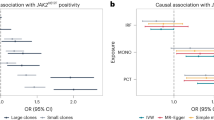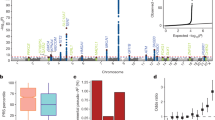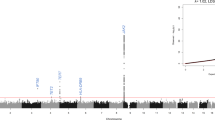Abstract
The somatic mutation of one of the ras oncogenes is now considered to be a critical step in the pathogenesis of many tumours1,2. Circumstantial evidence also suggests that some individuals may be genetically predisposed to malignancy3 and a general method used to analyse such disease susceptibility is the study of restriction fragment length polymorphisms (RFLPs) at particular loci4,5. The Harvey ras (Ha-ras) locus includes a hypervariable region (HVR) which consists of a series of 28-base-pair (bp) tandem repeats 3′ to the gene6. This arrangement gives rise to alleles of a wide range of sizes, making such genetic analysis possible. A previous study reported that white blood cell DNA from cancer patients frequently showed allelic restriction fragments at the Ha-ras locus which were found only rarely in normal unaffected individuals, and it was concluded that the inheritance of such unusual alleles may be linked to a susceptibility to cancer7. As this conclusion has major implications we sought to investigate whether this association could be confirmed in patients with myelodysplasia, a common haematological malignancy reported to have the highest frequency of rare alleles7. The Ha-ras alleles were characterized in normal healthy individuals and compared with those found in patients with myelodysplasia (MDS). Our results, reported here, show that the distribution of Ha-ras alleles in myelodysplastic patients is not significantly different from that in normal individuals.
This is a preview of subscription content, access via your institution
Access options
Subscribe to this journal
Receive 51 print issues and online access
$199.00 per year
only $3.90 per issue
Buy this article
- Purchase on Springer Link
- Instant access to full article PDF
Prices may be subject to local taxes which are calculated during checkout
Similar content being viewed by others
References
Bos, J. L. et al. Nature 315, 726–730 (1985).
Bos, J. L. et al. Nucleic Acids Res. 12, 9155–9163 (1984).
Burt, R. W. et al. New Engl. J. Med. 312, 1540–1544 (1985).
Gusella, J. F. et al. Nature 306, 234–239 (1983).
Thein, S. L. & Wainscoat, J. S. Disease Markers (Wiley, New York, in the press).
Capon, D. J., Chen, E. Y., Levinson, A. D., Seeburg, P. H. & Goeddel, D. V. Nature 302, 33–37 (1983).
Krontiris, T. G., Di Martino, N. A., Colb, M. & Parkinson, D. R. Nature 313, 369–373 (1985).
Bennet, J. M. et al. Br. J. Haemat. 51, 189–199 (1982).
Jeffreys, A. J., Wilson, J. & Thein, S. L. Nature 316, 67–73 (1985).
Old, J. M. & Higgs, D. R. in Methods in Haematology, vol. 6, 74–102 (Churchill Livingstone, Edinburgh, 1983).
Author information
Authors and Affiliations
Rights and permissions
About this article
Cite this article
Thein, S., Oscier, D., Flint, J. et al. Ha-ras hypervariable alleles in myelodysplasia. Nature 321, 84–85 (1986). https://doi.org/10.1038/321084a0
Received:
Accepted:
Issue Date:
DOI: https://doi.org/10.1038/321084a0
This article is cited by
-
A study of the structure and the expression of protooncogenes in human primary gastric cancer
Chinese Journal of Cancer Research (1990)
Comments
By submitting a comment you agree to abide by our Terms and Community Guidelines. If you find something abusive or that does not comply with our terms or guidelines please flag it as inappropriate.



